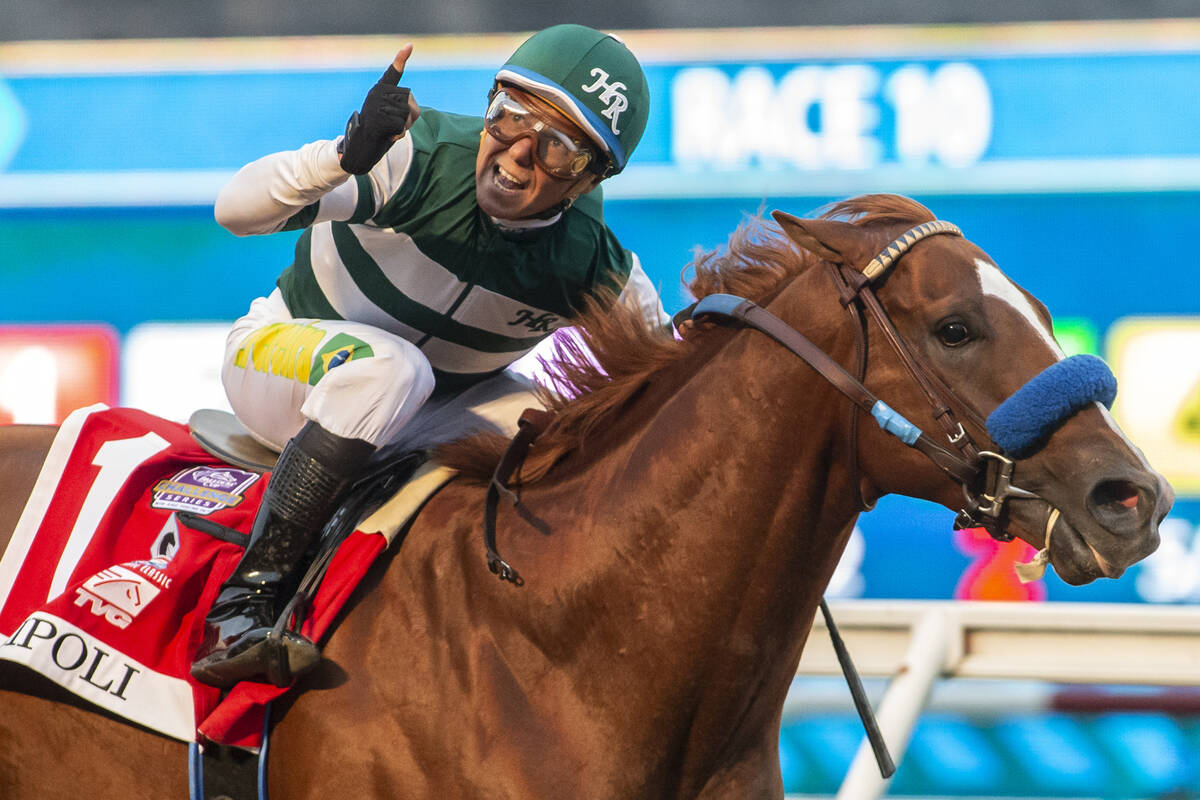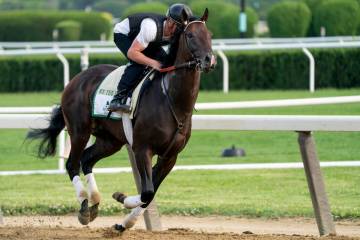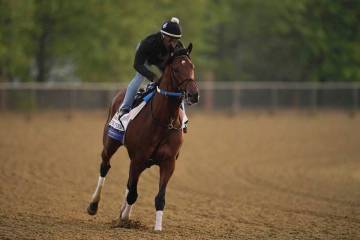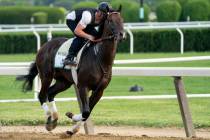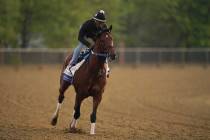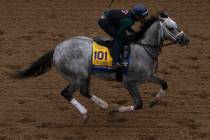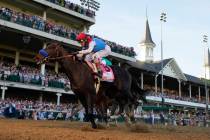Del Mar, Saratoga aim high but stay small to smash records
Less really is more.
The latest testimony in support of that maxim comes from Del Mar and Saratoga, both of which smashed handle records at their just-concluded summer meets.
Saratoga blasted past its previous high mark of $705 million from 2019, with $815.51 million and change passing through the windows and computers during its 40-day meet that ended on Labor Day.
If you don’t want to whip out your calculator, that works out to a 15.6 percent increase and an average daily haul of $20.39 million despite a fair number of weather-hampered days.
The historic upstate New York track also had fans pouring through the turrets, with attendance reported at 1.05 million. That’s in contrast to last year, when COVID-19 cleared the grandstands at both tracks.
Del Mar’s summer program, meanwhile, which was climbing off the gurney last year after being forced to cancel a weekend’s worth of races following a slew of COVID cases in the jockeys’ room, rebounded nicely as well.
The seaside track took in $569.98 million at a record daily rate of $18.38 million over its 31 days of racing, versus $431.9 million — or just about $12 million a day — over 36 days of racing in 2019.
That included a new single-day betting mark when just over $36 million was wagered on the 11-race Pacific Classic day card, shattering the previous record of $25.9 million set on Pacific Classic day in 2018.
The surge was in large part driven by field size, which increased from an average of 8.36 starters per race in 2020 to 8.45.
The message should be clear here, particularly as Kentucky Downs concludes its brilliant six-day meeting this weekend: Shorter meets or fewer racing days each week help tracks put on full interesting races that attract more betting.
Yes, it helps if you are located in an area where post cards are a major source of revenue. But as Kentucky Downs has proven, it’s not a requirement
That’s worth serious consideration by track executives and racing authorities as the population of racehorses continues to dwindle and the sport faces increasing wagering competition.
Kentucky Downs ties a bow on meet
On the subject of Kentucky Downs, the only European-style turf track in the U.S. has two more racing days left before it wraps up its two-weekend run.
Saturday’s card is particularly strong, with five stakes races headlined by the $1 million Calumet Turf Cup Stakes, a Grade 2 contest for 4-year-olds and up at 1½ miles that features two-time race winner Arklow and Zulu Alpha, winner of the 2020 Pegasus World Cup Turf Invitational Stakes (Grade 1) among other top turf runners.
Trainer Mike Maker, the all-time leading trainer at Kentucky Downs, will have ’em surrounded, saddling five — and possibly six if Dynadrive draws in from the also-eligible list — of the 12 horses expected to start in the race, including Zulu Alpha.
Sunday’s card offers three more stakes, capped by the $550,000 Kentucky Downs Ladies Marathon Stakes for fillies and mares at 1 5/16 miles.
I mentioned last week that many handicappers struggle to find winners over the unique undulating oblong course, but it took only two words to ensure a nice day at the windows over the first two days of racing at the Franklin, Kentucky, track co-owned by Las Vegas resident Ron Winchell. They were “Joel” and “Rosario.”
The peripatetic rider won 10 races out of the 17 he rode, returning a flat $40 profit to anyone who blindly backed him with $2 win bets during his opportunities.
Mike Brunker’s horse racing column appears Fridays. He can be reached at mbrunker@reviewjournal.com or 702-383-4656. Follow @mike_brunker on Twitter.
Ellis Starr's Calumet Turf Cup Stakes analysis
Tide of the Sea moved from the barn of Bill Mott to Mike Maker's care between his starts in August 2019 and June 2020. Since then he has won three times and finished second four other times in 11 races. The best of those in terms of his Equibase Speed Figures occurred in October at Keeneland when, at the distance of the Turf Cup, Tide of the Sea led from start to finish to earn a 107 figure. Two races later Tide of the Sea won the William L. McKnight Stakes in January at the 12 furlong distance of this race then three races later he led from the start and settled for second in the Grand Couturier Stakes on turf the Turf Cup distance. The key to the most successful finishes for Tide of the Sea came when he was sent to the lead from the start, resulting in all three of his wins in the last year. Jockey Luis Saez, fresh off winning the Saratoga 2021 riding title, has ridden Tide of the Sea just once previously, in the Grand Couturier, when Saez was aggressive from the opening of the gate and a race in which although Tide of the Sea was passed late, he was beaten by Gufo, who went on to win the Grade 1 Sword Dancer Stakes four weeks later. In this year's Turf Cup, I expect Saez to be equally aggressive from the start, and with no other true "need the lead" type in the field and with only Channel Cat to get in front of at the start in order to slow down the pace and play "come catch me" with this group, Tide of the Sea can post the mild upset to win this race.
Ajourneytofreedom and Glynn County both appear capable of winning if Tide of the Sea can't go all the way in front. They're both also trained by Mike Maker, with Glynn County owned by Three Diamonds Farm, which also owns Tide of the Sea. The most recent race in which Ajourneytofreedom tried this marathon turf trip was in mid-July at Saratoga when, after relaxing in sixth (of seven) for the first 1 1/4 miles, Ajourneytofreedom moved decisively from fifth, eventually winning by a neck. That effort earned a 111 figure not far from his best, a 113 figure earned when missing by a neck in the similar John B. Connally Stakes in January. With the second leading jockey in all of North America, Irad Ortiz, Jr., getting aboard Ajourneytofreedom for the first time, if the horse can stay close to Tide of the Sea and Channel Cat in the early stages, he could repeat either of those efforts in representative races to win. Glynn County also recently won at this mile and one-half turf trip, in June, with a similar effort to the one Ajourneytofreedom put forth in July. In that race, Glynn County sat in fourth in the early stages then rallied to win by a couple of lengths with a quick burst of speed. That effort only earned a 103 figure which was exceeded two races later when the colt earned a career best 109 figure finishing third in the Mr. D Stakes (formerly the Arlington Million) at the shorter distance of 1 1/4 miles. Back at the longer trip, Glynn County could be the one passing stablemate Tide of the Sea for the score.
Secondary contenders: Dynadrive will need help from one or more horses withdrawing from the 12 horse main body of the field to run in the Turf Cup as he is on the also-eligible list, but he must be given some consideration if he does run. First or second in 11 of 17 races, Dynadrive joined the Maker barn last October via a $50,000 claim. His best efforts came in his last two starts when second then first, the latter of the two earning a 104 figure which can be improved upon as Jose Ortiz rides back following being in the saddle for the very first time. Although the win in August in his most recent race came at the 1 1/4 mile distance, Dynadrive is bred to handle this mile and one-half trip and is another who can lay close to the likely slow early pace and be in the picture at the wire.
Bluegrass Parkway just won the Kentucky Downs Preview Turf Cup Stakes at Ellis Park, the same race Arklow used as a prep to win the Turf Cup in 2018. The effort earned Bluegrass Parkway a career best 105 figure and considering it was only the horse's fourth start since joining the powerful Maker barn and considering jockey Julien Leparoux rides him right back there's a chance he can run much better than his high odds will suggest is possible.
As to the three horses which may be favored by bettors, I feel they have less chance to win then their odds make it appear and for the most part I am going to take a stand against them winning. Arklow, who won this race in 2018 as a 4-year-old and last year as a 6-year-old (with a 116 figure), does not appear to be entering this year's Turf Cup in the same form, having finished sixth in the United Nations Stakes in July and seventh last month in the Del Mar Handicap. Zulu Alpha, the 2019 Turf Cup winner, is now an 8-year-old and is winless since July 2020, finishing third, fifth and seventh in his three starts since then. However, it must be noted that the best of the three was in last year's Turf Cup where Zulu Alpha finished third with a 114 figure. Channel Cat, who won the Dueling Grounds Derby (1 5/16ths mile) as a 3-year-old in 2018, has a bit more chance to win as compared to Arklow and Zulu Alpha as he won the Man O'War Stakes in May with a 113 figure. However, not only has he run poorly in two races since the Man O'War when finishing seventh and fourth, Channel Cat may not be as good as this 1 1/2 mile distance as he is at 1 3/8ths mile, with his record at this trip just 1-1-1 in seven starts.
The rest of the field, with their best Equibase Speed Figures: Breakpoint (CHI) (109); Crossfirehurricane (106); Epic Bromance (100); Fantasioso (ARG) (115); Imperador (ARG) (114); plus also-eligibles Artemus Eagle (101); Big Dreaming (106) and Time for Trouble (103).
Ellis Starr is the national racing analyst for Equibase. Visit the Equibase website for more on the race or to purchase handicapping products.



